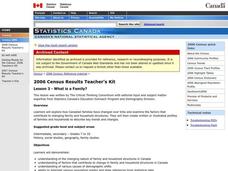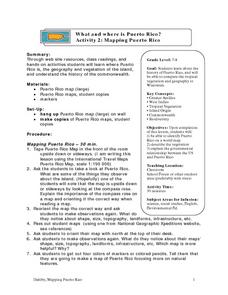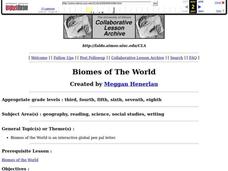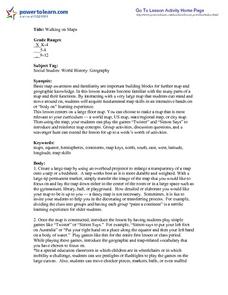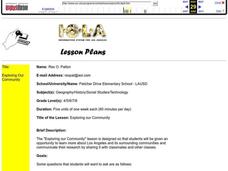Curated OER
One Country's Slave Trade
Students examine the slave trade. In this research skills lesson plan, students research the slave trade in a selected country. Students use databases to locate pertinent information in order to prepare an oral presentation.
Curated OER
Finding Historical Evidence: David Brion Davis
Students study the Tran-Atlantic Slave Trade and learn to evaluate historical arguments. For this slave trade lesson, students read about the Atlantic Slave System. Students take notes on slave trade and make a timeline for the...
Curated OER
What is a Family?
Students explore how Canadian families have evolved over time. In this census results lesson plan, students examine the factors that contribute to changing family and household structures. Students also create written and illustrated...
Curated OER
Meeting the Needs of an Aging Population
Learners examine population trends and predict how the age of the majority of Canadians will change 15 years from now in various geographic areas. They will gather statistical evidence that supports their projection. Learners will then...
Curated OER
Natural Disasters
Students read the book "Tsunami!" and discuss natural disasters and how they can prepare. This lesson is much more than a study of tsunamis. The lesson is chock-full of ways to study the Japanese culture across the curriculum. There are...
Curated OER
Social Studies: Great Circle Route
Students compare routes between Minnesota and China using a map and globe. Using the "great circle route" method, students find the shortest route between two points.
Curated OER
Japan and The Ring of Fire
Learners engage in a study of the volcanic forces and earthquakes associated with The Ring of Fire in the Pacific Ocean. The people of Japan are researched in how they have dealt with living in the area. Also students write in journals...
Curated OER
What and Where is Puerto Rico?
Students explore Puerto Rico. They create K-W-L charts of their prior knowledge of Puerto Rico and observe maps of Puerto Rico. They code the map for measurements and land and water forms. They explore websites to gain background on...
Curated OER
Mapping Puerto Rico
Students use maps to discover where Puerto Rico is located. In groups, they use the internet to research the vegetation. They also compare and contrast the relationship between the United States and Puerto Rico's government.
Curated OER
What And Where is Puerto Rico?: History of Puerto Rico
Students study the history of Puerto Rico. They define what a commonwealth is and how Puerto Rico became a commonwealth of the United States. They research websites for history of Puerto Rico and how it operates today. They complete...
Curated OER
Biomes of The World
Learners research different biomes, using links from global pen pal letters.
Curated OER
Settlement Patterns of the United States
Students examine the conditions that affected the way people settled in the United States. Using maps, they examine the topography and climate of different locations and determine the factors that do and do not allow settlement to occur....
Curated OER
Making Headlines
Students identify acts of kindness in the news. In this random acts of kindness lesson, students discuss kindness, find a news article about an act of kindness that took place in another country, locate the country on a map, and write a...
Curated OER
Rock-a-bye Babies in a Wetland
Pupils review the way human babies grow and what type of care they need. Using the internet, they are introduced to five different wetland habitat animals and how their babies grow. They discover how they are born and what the mothers...
Curated OER
Imperialism and Expansion: Part 1
Students explore the era of imperialism and expansion of the United States. In this American history lesson plan, students play a game regarding the U.S. attempts to expand the nation in the late 1800s and early 1900s.
Curated OER
Walking on Maps
Young scholars are introduced to the various types of maps and their functions. As a class, they play a game similar to twister to review map concepts. They answer questions about the map and use the internet to view larger maps of the...
Curated OER
What If We Run Out?
Young scholars explore the consequences of shrinking habitats and the human impact on wildlife populations. They participate in a game to study the consequences and describe the preservation of animal habitats.
Curated OER
Continents and Oceans
Young scholars identify oceans and continents and their locations on a map. They color-code and label their own map of the world's continents and oceans. They play the game Continents and Oceans to identify specific areas.
Curated OER
Exploration Watershed
Students discuss what a watershed is, and locate watersheds on a map. In this watershed lesson, students use the information they have been introduced to and create a color coded watershed map of their own.
Curated OER
Be a Watershed - Create a Living River
Students investigate water ways by conducting an experiment with classmates. In this natural resources instructional activity, students define a watershed and identify where large ones are located within the United States. ...
Curated OER
If the World Were a Village
Students examine the conditions of the global economy. As a class, they discuss the political, economic and cultural differences around the world. They review the concepts of distribution and scarcity and identify the costs and...
Curated OER
Ancient Cultures
Students develop archeological skills in order to explain how scientists determine what ancient cultures were like. They develop an appreciation of the work that is involved in finding out about our past.
Curated OER
A Look at the Population Density of the United States
Young scholars acquire census information and create maps of the population density of the United States on different scales. They role play the roles of workers of a retail company and they use the population data to market to their...
Curated OER
Exploring our Community
Students research Los Angeles and its surrounding communities. They create digital presentations of the information they have gathered by answering the question included in the lesson.




